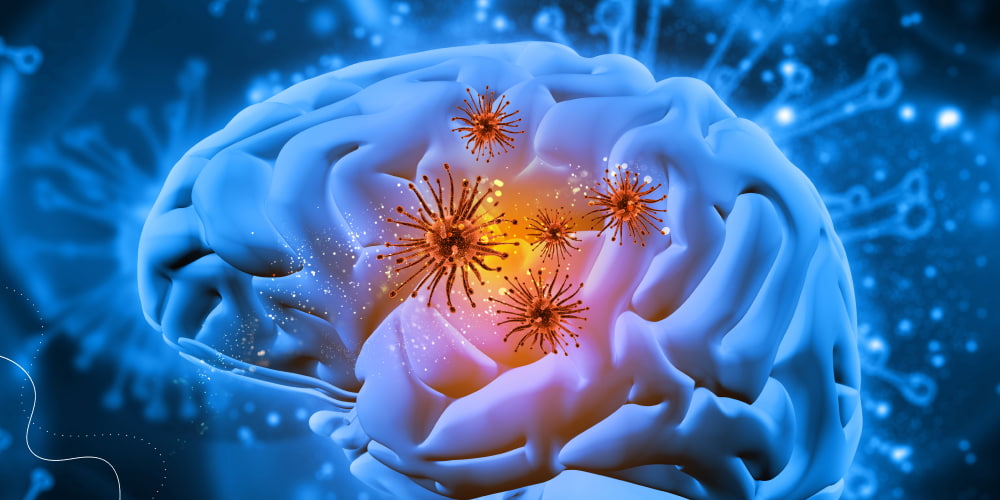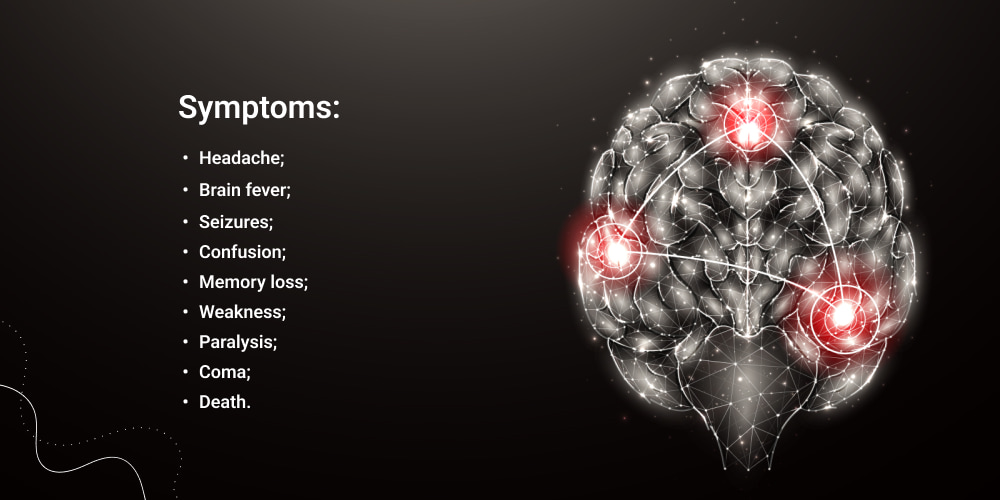Encephalitis is a severe and potentially deadly condition that causes brain infection. It can be caused by many factors, including infections, injuries, or autoimmune diseases. Symptoms vary depending on the cause of encephalitis but may include brain fever, headache, seizures, or coma.
Treatment of brain infection depends on the cause of encephalitis but may include antibiotics, antivirals, or steroids. For some people, encephalitis can lead to long-term health problems such as epilepsy or memory loss.
Encephalitis affects 10-15 persons per 100,000 people yearly, with over 250,000 cases identified in the United States in the previous decade alone. The illness can affect anybody, although it is more common among young individuals. Potentially, any virus can cause encephalitis, but not every person infected with the virus will suffer from this disease.
Keep reading to learn more about this serious condition and how to get treatment if you are affected by it.
What are the Leading Causes of Encephalitis?
Many potential causes of encephalitis include viruses, bacteria, fungi, and parasites. In some cases, the exact cause may never be determined.
The most common viral causes of encephalitis include:
- Herpes simplex virus (HSV) types 1 and 2 are the same viruses that cause cold sores and genital herpes.
- Varicella zoster virus (VZV) – is the same virus that causes chickenpox and shingles.
- Epstein-Barr virus (EBV) – is the same virus that causes mono.
- Cytomegalovirus (CMV).
- Human herpesvirus 6 (HHV6).
- West Nile virus.
- Japanese encephalitis virus.
Bacterial causes of encephalitis include:
- Tick-borne illnesses, such as Lyme disease and Rocky Mountain spotted fever.
- Tabies – this is usually caused by a bite from an infected animal, such as a dog or bat.
- Meningitis – this is an infection of the meninges, the thin membranes that surround the brain and spinal cord.
- Syphilis – this is a sexually transmitted infection (STI) caused by the bacteria Treponema pallidum.
Fungal causes of encephalitis include:
- Cryptococcosis – this is caused by the fungus Cryptococcus neoformans, which is found in soil and bird droppings.
- Histoplasmosis – this is caused by the fungus Histoplasma capsulatum, which is found in bird and bat droppings.
Parasitic causes of encephalitis include:
- Sleeping sickness – this is caused by the parasite Trypanosoma brucei, which is found in Africa.
- Cysticercosis – this is caused by the parasite Taenia solium, which is found in undercooked pork.
There are also several noninfectious causes of encephalitis, including:
- Autoimmune conditions, such as lupus.
- Tumors.
- Head injuries.
- Stroke.
As you can see, there are a lot of sources of this disease, so you should always be careful to stay healthy.
What is the Range of Encephalitis Types?
Fortunately, this severe disease does not have many types. There are only two types of encephalitis: primary and secondary.
Primary encephalitis is caused by a virus, such as the herpes simplex virus (HSV), that directly attacks the brain.
Secondary encephalitis is caused by an infection elsewhere in the body that spreads to the brain. Bacteria, fungi, or parasites can cause this.
These types of diseases include the following varieties:
- Tick-borne encephalitis (spring-summer, taiga).
- Japanese encephalitis.
- Economo encephalitis (epidemic, lethargic, sleeping sickness).
- Herpetic encephalitis.
- Measles encephalitis.
- Encephalitis with chickenpox.
- Influenza encephalitis (toxic-hemorrhagic).
What Are the Symptoms of Encephalitis?
Symptoms of encephalitis can vary depending on the cause but often include:
Encephalitis is a severe and potentially life-threatening inflammation of the brain. The most common symptoms of encephalitis include headache, high fever, seizures, and confusion. In severe cases, it can lead to coma or death.
What Are the Possible Encephalitis Complications?
Encephalitis can cause a range of complications, including:
- Seizures.
- Coma.
- Personality changes.
- Problems with vision or hearing.
- Paralysis.
- Death (in severe cases).
- Acute encephalopathy.
- Swelling brain.
If you experience any of these symptoms, it’s important to seek medical attention immediately. Early diagnosis and treatment are essential for the best possible outcome.
As for the long-term effects of encephalitis, in some cases, people who have had this disease may experience the next effects, such as:
- Fatigue.
- Headaches.
- Memory problems.
- Mood swings.
- Muscle weakness.
- Paralysis (in severe cases).
You must talk to your doctor if you have any of these symptoms. Treatments available can help lessen the symptoms and improve your quality of life.
How Encephalitis Affects Nerve System
Encephalitis is a rare but severe condition that causes inflammation of the brain. Encephalitis can occur when viruses or other pathogens enter the brain and begin to multiply. This can cause the immune system to respond, leading to inflammation.
With encephalitis, the brain is affected, so neurons (nerve cells in the brain) suffer. People with encephalitis experience consequences like stroke, head injury, and other brain diseases. As a rule, they are associated with impaired cognitive and speech functions.
What is the Treatment of Encephalitis?
The most common treatment for encephalitis is an antiviral medication. If the person has a bacterial infection, they may also be prescribed antibiotics. In some cases, corticosteroids may be used to reduce inflammation. Treatment will also focus on relieving symptoms and supporting the person’s recovery. This may include providing oxygen, fluids, and medications to control seizures or fever.
The person may also need to be hospitalized for monitoring and support. Recovery from encephalitis can take weeks or months. Some people experience long-term effects, such as memory problems, learning difficulties, or paralysis. With early diagnosis and treatment, most people make a full recovery and avoid the effects mentioned above. However, encephalitis can be fatal in some cases.
Treatment also may include:
- Antibiotics to treat a bacterial infection.
- Antiviral medications to treat a viral infection.
- Steroids to reduce inflammation.
- Pain relievers for headaches and muscle aches.
- Sedatives to help relieve anxiety or agitation.
How to Prevent This Brain Infection?
The best way to prevent viral encephalitis is to avoid exposure to viruses that can cause the disease. Try to practice good hygiene. Wash hands frequently and thoroughly with soap and water, particularly after using the toilet and before and after meals.
People often get encephalitis from parasites that actively infect people in the summer. They are usually found in thick grass or near water. An ordinary trip to the river can be a complete disaster for your health. To avoid this, check your body for ticks several times during your time in nature. Also, inspect yourself before leaving. If you are not alone, you can ask a friend for help and check it.
This procedure does not take much time, but it can save your life or the life of your loved ones.
Diagnosis
You should be checked for encephalitis if you have a combination of symptoms such as fever, altered state of consciousness, seizures, or changes in behavior or movement. It is critical to detect encephalitis as soon as possible to reduce mortality risk or long-term consequences.
Your healthcare professional may run tests, do a medical exam, and review your medical history to diagnose encephalitis. The doctor may inquire about your immunization history, recent colds, and other respiratory or gastrointestinal problems. They will want to know whether you have recently been bitten by a tick, if you have been around pets or other animals, or if you have gone to specific regions.
Tests for encephalitis can include:
- A brain MRI or CT scan is a type of neuroimaging.
- A lumbar puncture (spinal tap) will be performed to look for symptoms of infection in the brain or spinal cord.
- EEG is used to detect seizures or particular patterns of electrical activity in the brain.
- Blood, urine, and stool tests identify the organisms or antibodies responsible for an illness.
Additional tests may include:
- A sputum culture examines the material coughed up from the lungs to determine whether or not specific infections are present.
- A biopsy of damaged brain tissue may be conducted in rare circumstances to allow for inspection under a microscope.
- Intracranial pressure monitoring (ICP) detects the pressure within the skull to monitor brain swelling.
What Is the Prognosis for Encephalitis?
The prognosis for encephalitis varies depending on the cause and severity of the condition. In general, however, the earlier encephalitis is diagnosed and treated, the better the outcome is likely to be. With proper medical treatment, most people make a full recovery. In some cases, however, encephalitis can lead to long-term complications or even death. If you or someone you know have encephalitis, it’s important to seek medical attention immediately. Early diagnosis and treatment are essential for the best possible outcome.
Persistent neurological and psychiatric complications develop in 10–20% of infected individuals. The lethality of the infection is 1-2% for the European subtype and 20-25% for the Far East; usually, death occurs within 5-7 days after the onset of neurological symptoms.
Bottom Line
Encephalitis is a severe inflammation of the brain. It can be caused by a virus, bacteria, or other organisms. Autoimmune reactions or certain drugs can also cause encephalitis. The symptoms of encephalitis include headache, fever, seizures, and confusion. The severity of the symptoms depends on the cause and how quickly the condition is treated. Treatment for encephalitis typically includes hospitalization and aggressive supportive care. Early diagnosis and treatment are critical to a good outcome.
Since this is a fatal disease, it is essential to get the necessary help promptly. If you notice at least one of the above symptoms in yourself or your loved ones, immediately contact the clinic for assistance.
To get only professional and high-quality help, you should consider Lone Star Neurology. To make an appointment, you can use the contact button on the website. After that, you are guaranteed to receive professional assistance from an experienced team.
FAQ
- What are the warning signs of encephalitis?
They are:
- Headache.
- Disorders of movement.
- Light sensitivity.
- Sound sensitivity.
- Stiffness in the neck.
- What happens if you get encephalitis?
Encephalitis can cause minor flu-like symptoms, such as a fever or headache, or it might cause no symptoms. Encephalitis can also result in severe symptoms such as disorientation, convulsions, or difficulties with mobility or senses such as sight or hearing.
- How long can encephalitis last?
The acute phase of the sickness (when symptoms are the most intense) usually lasts up to a week. Complete healing might take several weeks or months.
- How do you test for encephalitis?
Viruses and other infectious agents can be found in blood, urine, or back-of-the-neck excretions. Electroencephalogram (EEG), the electrical activity of your brain is monitored by electrodes placed to your scalp. Specific abnormal patterns may indicate encephalitis.













Please, leave your review
Write a comment: